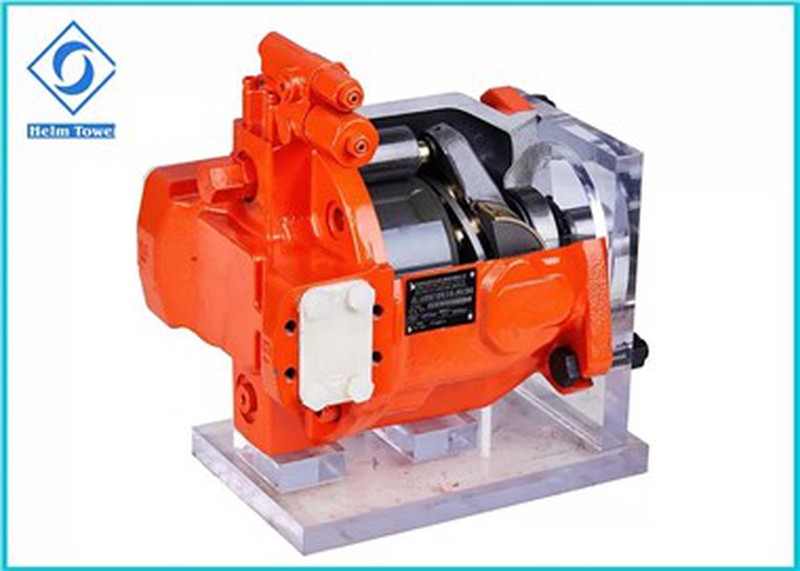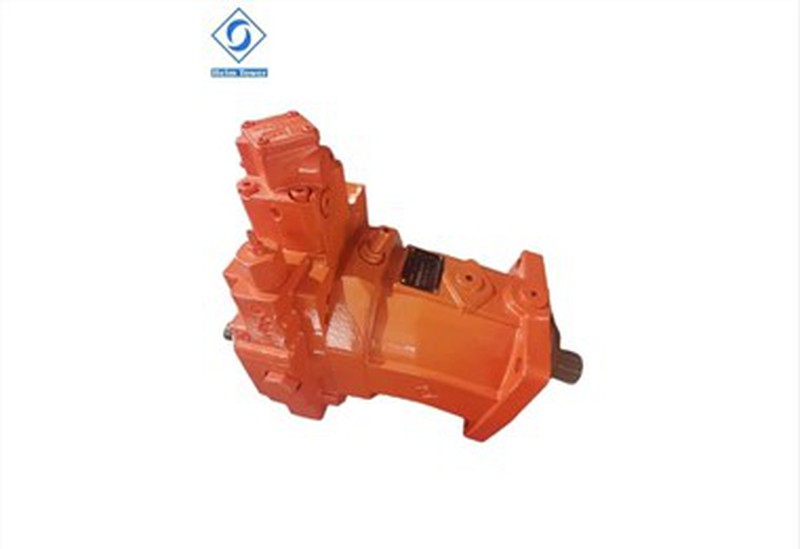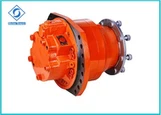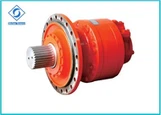Hydraulic Pump
A hydraulic pump is a mechanical source of power that converts mechanical power into hydraulic energy. Hydraulic pumps are used in hydraulic drive systems and can be hydrostatic or hydrodynamic. They generate flow with enough power to overcome pressure induced by a load at the pump outlet. When a hydraulic pump operates, it creates a vacuum at the pump inlet, which forces liquid from the reservoir into the inlet line to the pump and by mechanical action delivers this liquid to the pump outlet and forces it into the hydraulic system. Hydrostatic pumps are positive displacement pumps while hydrodynamic pumps can be fixed displacement pumps, in which the displacement cannot be adjusted, or variable displacement pumps, which have a more complicated construction that allows the displacement to be adjusted.
Advantages of Hydraulic Pump
Pump efficiency
Fluid’s incompressible nature in hydraulic systems allows an operator to make and apply mechanical power in an effective and efficient way. Practically all force created in a hydraulic system is applied to the intended target.
System compactness
Hydraulic systems are typically smaller than their mechanical and electrical counterparts while producing equivalents amounts of power, providing the benefit of saving physical space.
Hydraulic system customizability
Because of the relationship between area, pressure, and force (f = p x a), modifying the force of a hydraulic system is as simple as changing the size of its components.
Hydraulic pump simplicity
Hydraulic systems can transfer energy on an equal level with many mechanical and electrical systems while being significantly simpler in general. A hydraulic system, for example, can easily generate linear motion. On the contrary, most electrical and mechanical power systems need an intermediate mechanical step to convert rotational motion to linear motion.
-
Hydraulic Axial Piston Pump A10VSO1.Completely interchangeable with original. 2.Very competitive price. 3.Low-noise, high efficiency,Add to Inquiry
-
Hydraulic Piston Pump A10VSO71DFRThe A10VSO range of variable displacement piston pump is designed for use in open circuit hydraulicAdd to Inquiry
-
Piston Pump A10V Radial LoadingA10V variable displacement hydraulic piston pump. Nominal pressure 280Bar, Peak pressure 350Bar;.Add to Inquiry
-
Hydraulic Piston Pump A4VSOModels: A4VSO40 A4VSO71 A4VSO125 A4VSO180 A4VSO250 A4VSO355 A4VSO500 A4VSO750. Rexroth Axial pistonAdd to Inquiry
-
Hydraulic Piston Pump A10VSO28DR31RThe A10VSO range of variable displacement piston pump is designed for use in open circuit hydraulicAdd to Inquiry
-
Piston Pump for forestry MachineryMobile Equipment: Wheeled Excavator;Mining Excavator;Compact excavators; Wheeled loaders; BackhoeAdd to Inquiry
-
Hydraulic Piston Pump for Rexroth1.Low-noise, high efficiency, high reliability, long life. 2.Small size, high power density.Add to Inquiry
-
High Pressure Axial Piston Pump1.Continuous working pressure up to 280bar, the instantaneous maximum working pressure up toAdd to Inquiry
-
Hydraulic Pump A7V-Variable pump with axial tapered piston rotary group of bentaxis design, for hydrostatic drives inAdd to Inquiry
-
Hydraulic Pump for Rexroth A10VOur pumps are mainly used for construction machinery, geological drilling equipment, specialAdd to Inquiry
- Tel: +86-574-86361510
- Fax: +86-574-86305076
- David liu WhatsApp/Wechat/Mobile: 0086-13567904566
- Zoe Zhu WhatsApp/Wechat/Mobile: 0086-13906844199
- Sales@hydraulics-china.com
- jody@hydraulics-china.com
- Add: NO.1818 ZHENLUO EAST ROAD, ZHENHAI DISTRICT, NINGBO, CHINA
Why Choose Us
Our factory
Ningbo Helm Tower Noda Hydraulic Co., Ltd is belong to Ningbo WENKUI Group, which is a professional designer, manufacturer and exporter for HMS/HMCR Hydraulic motors and parts, Hydraulic Pumps and parts: A2FO, A2F, A2VK, A4V, A4VF, A6V, A8VO, A10VG, A10V, A10VSO, A11VO,HDC,HTC,HFSeries Drum cutter, hydraulic winch. Our company located in Ningbo, Holding $5 million registered capital, covering area is over l0,000 square meters, it is very near and convenient to th e seaport and airport.
Strict inspection standard
The automatic production line of rotors has been put into production in the end of 2019, annual production of 34,000 pcs. We not only have a strict manual inspection standard during the production line, but also have a motor test center and pump test center. And we passed ISO9001:2008. CCS , TUV and SGS certificate.
Strong R&D
We had a strong R&D, technology support team, most of them working in the hydraulic industry over 10 years, we use high grade alloy steel material, also adopted advance heat treatment QPQ, with advance process equipment which imported from USA, CNC machine, all of these ensure our MS and MCR hydraulic motor and spare parts can be completely replace original brand on the dimension and performance character.
Production market
Our products were widely exported to USA, European, South American, Australian, African, Midde East, South East Asia and other countries and region. With competitive price, excellent performance and prompt delivery, we sincerely welcome you to establish co-operative.
Types of Hydraulic Pump
These are positive displacement hydraulic pumps that maintain a stable flow rate at varying pressures. This type of pump includes a variable no. Of vanes placed onto a rotor that turns in the cavity and also a pressure relief valve that avoids an increase in pressure within the pump from harming it. Vane pumps operate at extremely low noise levels with a constant flow rate. These pumps generate less noise while maintaining a high speed of up to 3,000 rpm.
These pumps are available in two types internal & external gear pumps. External gear pumps include two spur gears that are arranged externally whereas internal gear pumps include two spur gears that are arranged internally. These types of gear pumps are used for delivering a consistent amount of fluid through each rotation of the gears.
These are commonly used hydraulic pumps which are used for supplying water in the agricultural, plumbing, waste management, sewage, manufacturing & engineering industries. These pumps work by using hydropower rather than an external energy source. So these pumps are a prominent choice in some developing countries where the accessibility of the electricity & fuel necessary to strengthen motorized pumps is restricted. The hydropower usage will also decrease energy utilization for plants & industrial factories.
These are hydraulic liquid transmission pumps that work by using electricity. These pumps are normally utilized to move hydraulic liquid from a tank to a hydraulic cylinder. There are different hydraulic pumps there, but the defining characteristic of every type is the utilization of pressurized fluids to complete a job.
These are fluid transmission machines that use the mechanical power produced by a physically operated actuator. Here an actuator could be a toggle, lever, handle, etc. These pumps are used for water pumping, hydraulic fluid distribution, etc. These pumps are used for different tasks like the direction of hydraulic liquid to circuits within helicopters, instrument calibration & piston actuation within hydraulic cylinders.
Hydraulic pumps operate on a 12v dc supply through a battery/motor o move water into or out of the preferred location. These pumps are normally used to push, pull & also lift heavy loads within motorized & vehicle machines. These hydraulic pumps are very common as they work on small batteries.
These pumps are also known as pneumatic hydraulic pumps which use compressed air to activate a pump mechanism and generate energy from a pressurized fluid. These pumps are used in different industries to help in the lifting of heavy loads & transportation of materials through minimal initial force.

Construction, excavation, automotive manufacturing, agriculture, manufacturing, and defense contracting are just a few industries that use hydraulic power on a daily basis. Because hydraulics are so widely used, hydraulic pumps are unsurprisingly found in a wide variety of machines and industries. Pumps perform the same basic function in all contexts where hydraulic machinery is used: They move hydraulic fluid from one location to another to generate hydraulic energy and pressure.
Hydraulic pumps are used in elevators, automotive brakes, automotive lifts, cranes, aeroplane flaps, shock absorbers, log splitters, motorboat steering systems, garage jacks, and other products. Hydraulic pumps are most commonly used on construction sites in large hydraulic machines and various types of "off-highway" equipment such as excavators, dumpers, diggers, and so on. In other settings, such as offshore work areas and factories, hydraulic systems are used to power heavy machinery, cut and bend material, move heavy equipment, and so on.
Hydraulic pumps play an important role in converting fluid power into mechanical energy, allowing the hydraulic system to perform the desired functions. Because there are various types and variations of hydraulic pumps, it is critical to choose the ones that will best meet your hydraulic specifications and requirements to perform the necessary functions.
Hydraulic pumps play an important role in converting fluid power into mechanical energy, allowing the hydraulic system to perform the desired functions. Because there are various types and variations of hydraulic pumps, it is critical to choose the ones that will best meet your hydraulic specifications and requirements to perform the necessary functions.
Components of Hydraulic Pump
Hydraulic pump reservoir
The hydraulic reservoir's function is to hold a volume of liquid, transfer heat from the system, permit solid pollutants to settle, and aid in releasing moisture and air from the liquid.
Hydraulic pump
Mechanical energy is changed to hydraulic energy by the hydraulic pump. This is accomplished through the movement of liquid, which serves as the transmission medium. All hydraulic pumps operate on the same basic principle of dispensing fluid volume against a resistive load or pressure.
Hydraulic pump valves
Hydraulic valves are utilized to start, stop, and direct liquid flow in a system. Hydraulic valves are made of spools or poppets and can be actuated hydraulically, pneumatically, manually, electrically, or mechanically.
Hydraulic pump actuators
The end result of pascal's law is hydraulic actuators. This is the point at which hydraulic energy is transformed back to mechanical energy. This can be accomplished by using a hydraulic cylinder to transform hydraulic energy into linear movement and work or a hydraulic motor to transform hydraulic energy into rotational motion and work. Hydraulic motors and hydraulic cylinders, like hydraulic pumps, have various subtypes, each meant for specific design use.
How to Choose Hydraulic Pump
Before delving into the intricate world of hydraulic pumps, it's imperative to embark on a journey of comprehensive assessment regarding your application's unique requirements. Factors such as flow rate, pressure, and system size are the vital parameters that will govern the choice of the pump that best suits your needs. Neglecting to match your pump selection with these specific demands can lead to potentially dire consequences: Either under-sizing, which results in system inefficiency, or over-sizing, causing unnecessary costs and energy consumption. The first step is calculating your hydraulic system's required flow rate and pressure. These parameters serve as the cornerstones of your pump selection.
Efficiency is a pivotal aspect of hydraulic systems, as it directly influences energy consumption and the system's overall performance. When striving to make an energy-efficient choice, meticulous research into the efficiency ratings of different pumps is indispensable. Seek pumps that skillfully strike the equilibrium between power input and output, finely tailored to your specific application. Efficiency in hydraulic systems is all about conserving energy and optimizing performance while minimizing heat generation. Choosing a more efficient pump can lead to significant cost savings over time. Energy-efficient pumps contribute to sustainability and reduce operating expenses, making them an excellent choice for cost-conscious individuals and organizations.
Reliability is paramount when it comes to selecting a hydraulic pump. Opt for a pump with a well-established track record of dependability. Particularly in industrial settings, downtime due to pump failures can result in high costs and disruptive setbacks. To mitigate such risks, it is essential to thoroughly investigate the manufacturer's reputation and the pump's history of reliability. A pump that is easy to maintain saves time and minimizes operational costs in the long term. Regular maintenance is the lifeline of any hydraulic system; it ensures prolonged functionality and guards against unexpected breakdowns that can harm your operations.
Budget constraints are a reality for most projects, and this is where the intersection of financial considerations and hydraulic engineering becomes especially crucial. When evaluating hydraulic pumps, it is crucial to consider the initial upfront cost and the long-term cost of ownership. The latter includes maintenance expenses, energy consumption, and potential replacement costs. While there may be a temptation to opt for the least expensive option initially, it's imperative to strike a balance between your budget limitations and the performance requirements of your application. Investing more in a higher-quality and more efficient pump can often lead to substantial payoffs in reduced operating costs and improved system performance. High operating costs and the potential need for frequent replacements can quickly outweigh the initial savings of a less expensive pump.
Hydraulic systems rely on different pump types, each with its unique advantages. Gear pumps are simple and reliable, ideal for moderate-pressure applications. Vane pumps offer quiet operation and versatility, making them suitable for fluctuating loads. Piston pumps excel in high-pressure scenarios and come in various designs. To make an informed choice, comprehend these pump types' characteristics and performance capabilities and select the one that best aligns with your specific application's demands. Your pump choice can significantly impact the efficiency and effectiveness of your hydraulic system, so careful consideration is essential.
The operator must be familiar with the operation essentials of hydraulic component control mechanism; be familiar with the relationship between the rotation direction of adjusting knobs of various hydraulic components and the changes of pressure and flow, etc. To prevent accidents caused by adjustment errors. Check the oil temperature before starting the pump. If the oil temperature is lower than 10℃, no-load operation shall be carried out for more than 20min before loading operation. If the room temperature is below 0℃ or above 35℃, heating or cooling measures should be taken before starting. Pay attention to oil temperature rise at any time during work. During normal operation, the temperature of oil in the oil tank of general hydraulic system shall not exceed 60℃; the oil temperature in the oil tank of the hydraulic system or high-pressure system of the program-controlled machine tool shall not exceed 50℃; the temperature rise of precision machine tools should be controlled below 15℃.
The hydraulic oil should be checked and replaced regularly. For new hydraulic equipment put into use, the oil tank should be cleaned and replaced after 3 months of use. After that, cleaning and oil change shall be carried out every six months or once a year according to the requirements of the equipment manual. Attention should be paid to the working condition of the filter during use. The filter element should be cleaned or replaced regularly.

Our factory
Ningbo Helm Tower Noda Hydraulic Co., Ltd is belong to Ningbo WENKUI Group, which is a professional designer, manufacturer and exporter for HMS/HMCR Hydraulic motors and parts, Hydraulic Pumps and parts: A2FO, A2F, A2VK, A4V, A4VF, A6V, A8VO, A10VG, A10V, A10VSO, A11VO,HDC,HTC,HFSeries Drum cutter, hydraulic winch. Our company located in Ningbo, Holding $5 million registered capital, covering area is over l0,000 square meters, it is very near and convenient to th e seaport and airport, our products are widely used in Marine, Coal mine machinery, Agriculture, Forest machinery, Skid loader, Excavator, Road machinery, Construction machinery. We have already finished the construction of automatic production lines. Our production equipments include Korea Horizontal Machining Center(KH50G), Three-Dimensional Measuring Instrument, Incurve Machining Center(Verical Numerical Control Curve Grinding Machine MK8580), Vertical Machining Center(VMC4020A), Rotor Slot grinding Machinc(Numerial Control High Power Grinding Form Machine MKL7132*8.5).The automatic production line of rotors has been put into production in the end of 2019, annual production of 34,000 pcs. We not only have a strict manual inspection standard during the production line, but also have a motor test center and pump test center. And we passed ISO9001:2008. CCS , TUV and SGS certificate.




Certificate





FAQ
We're professional hydraulic pump manufacturers and suppliers in China, specialized in providing high quality products with low price. We warmly welcome you to wholesale or buy discount hydraulic pump for sale here from our factory.
Hydraulic Drive Motor For Excavator swing motor in excavator, danfoss piston motor, roller stator motor













